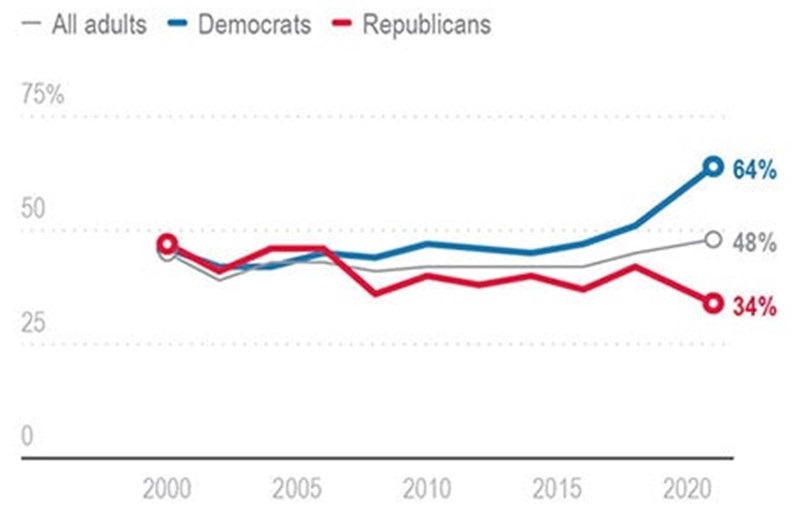Trust in Science Now Deeply Polarized
 Thursday, January 27, 2022 at 11:05AM
Thursday, January 27, 2022 at 11:05AM The Associated Press is reporting that Republicans' faith in science is falling as Democrats rely on it even more, with a trust gap in science and medicine widening substantially during the COVID-19 pandemic, new survey data shows (Figure 1) (1).

Figure 1. Percentage of adults who say they have a great deal of confidence in the scientific community.
Overall, 48% of Americans say they have "a great deal" of confidence in the scientific community, the 2021 General Social Survey data shows. Sixty-four percent of Democrats say that, compared with roughly half as many Republicans, 34%. The gap was much smaller in 2018, when 51% of Democrats and 42% of Republicans had high confidence.
It's the largest gap in nearly five decades of polling by the General Social Survey, a widely respected trend survey conducted by NORC at the University of Chicago that has been measuring confidence in institutions since 1972. The most recent survey was conducted Dec. 1, 2020, through May 3, 2021, and includes interviews with 4,032 American adults. Results for the full sample have a margin of error of plus or minus 2 percentage points.
That is unsurprising to more than a dozen scientists reached for comment by The Associated Press, but it concerns many of them. "We are living at a time when people would rather put urine or cleaning chemicals in their body than scientifically vetted vaccines," University of Georgia meteorology professor Marshall Shepherd told the AP in an email. "That is a clear convergence of fear, lack of critical thinking, confirmation bias and political tribalism."
Science used to be something all Americans would get behind, Rice University historian Douglas Brinkley said. "But we now see it falling prey to the great partisan divide," he said. "The world of science should be a meeting house where right and left can agree on data. Instead, it's becoming a sharp razor's edge of conflict."
The deepening polarization was not evident for other institutions asked about on the poll, according to Jennifer Benz, deputy director of The Associated Press-NORC Center for Public Affairs Research. "It's certainly plausible that this is a result of how politicized the pandemic became in the months between when it emerged and when the survey ran," Benz said. "It is definitely a stark change for these particular trends on confidence in scientific leaders and leaders in medicine, to see this degree of polarization."
Kelvin Droegemeier, former science adviser to President Donald Trump, said he thinks the pandemic increased the general public's insight into how scientific research works but the ever-evolving science probably seemed chaotic at times and the urgency of the pandemic complicated policymaking. "We hear 'follow the science,' but which results? The challenge lies in how to best use the scientific results, recognizing that what appears to be an 'answer' one day may be overturned, wholly or partly, another day," Droegemeier told the AP in an email.
That messiness, sometimes weak communication and political philosophies play into the trust gap, said Marcia McNutt, president of the National Academy of Sciences, which was set up by President Abraham Lincoln to offer the federal government expert advice. Scientists and policy makers tend to be conservative — not politically but in terms of being cautious and wary of risk — pushing safety, masks and vaccines while "Republicans as a group value individual liberty," McNutt said.
John Holdren, who was President Barack Obama's science adviser, said he blames GOP leaders' "nonstop denial and deception." The consequence of declining trust in the scientific community among Republicans is clear: AP-NORC polling shows Republicans continue to be less likely than Democrats to be vaccinated. Sudip Parikh, chief executive officer of the American Association for the Advancement of Science, the world's largest general science organization, said it's clear that science has become a wedge issue for many politicians. Some have tied themselves to it, he said, and others have seen value in shooting at it "because it helps them politically."
Parikh said he found it ironic that much of the distrust in science is spread by technology — social media, smartphones — that only exists because of scientific advances. Astrophysicist Neil deGrasse Tyson agreed: "The struggle continues, trying to get the general public to embrace all of the science the way they unwittingly embrace the science in their smartphones."
At the SWJPCCS we look at these numbers as disturbing. Rather than mistrust one wonders if political expediency might be a better term. Unfortunately, it has cost many, predominately Republicans, their lives (2). Faith in a demagogue can be potentially fatal.
Richard A. Robbins, MD
Editor, SWJPCCS
References
- Borenstein S, Fingerhut H. Americans' Trust in Science Now Deeply Polarized, Poll Shows. Associated Press. January 26, 2022. Available at: https://www.usnews.com/news/politics/articles/2022-01-26/americans-trust-in-science-now-deeply-polarized-poll-shows (accessed 1/26/22).
- Leonhardt D. Omicron Threatens Red America. NY Times. December 17,2021. Available at: https://www.nytimes.com/2021/12/17/briefing/omicron-spread-red-america.html (accessed 1/26/22).
